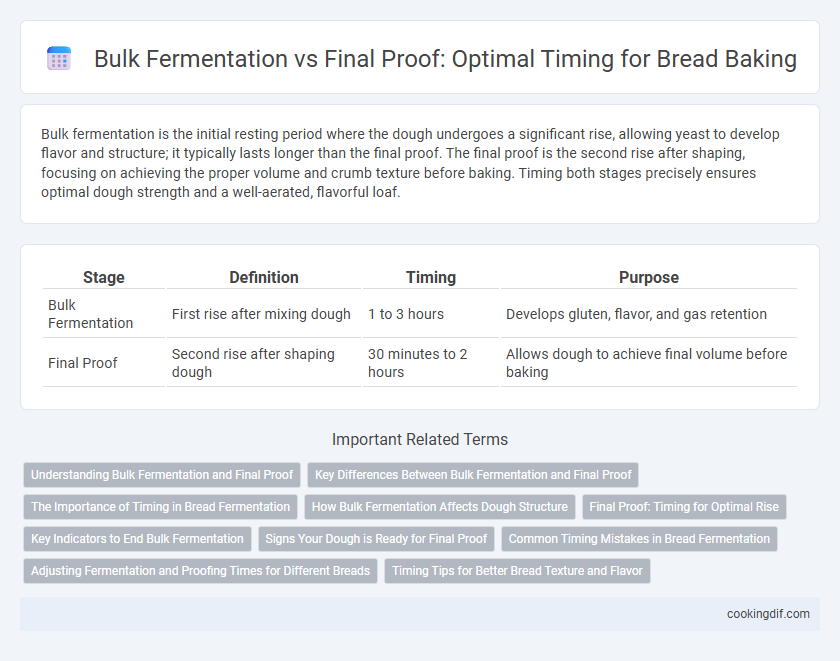Bulk fermentation is the initial resting period where the dough undergoes a significant rise, allowing yeast to develop flavor and structure; it typically lasts longer than the final proof. The final proof is the second rise after shaping, focusing on achieving the proper volume and crumb texture before baking. Timing both stages precisely ensures optimal dough strength and a well-aerated, flavorful loaf.
Table of Comparison
| Stage | Definition | Timing | Purpose |
|---|---|---|---|
| Bulk Fermentation | First rise after mixing dough | 1 to 3 hours | Develops gluten, flavor, and gas retention |
| Final Proof | Second rise after shaping dough | 30 minutes to 2 hours | Allows dough to achieve final volume before baking |
Understanding Bulk Fermentation and Final Proof
Bulk fermentation is the initial, long fermentation stage where yeast metabolizes sugars, producing gas and flavor compounds critical for dough development, typically lasting from 1 to 3 hours depending on temperature and dough hydration. Final proof occurs after shaping, allowing the dough to rise further and develop its final volume and crumb texture, usually requiring 30 minutes to 2 hours. Understanding the timing and conditions of both bulk fermentation and final proof is essential for controlling bread texture, flavor, and oven spring.
Key Differences Between Bulk Fermentation and Final Proof
Bulk fermentation is the initial rise where yeast activity increases, developing dough flavor, gluten strength, and gas retention over 1 to 3 hours at 75-80degF. Final proof occurs after shaping, allowing dough to rest and expand just before baking, typically lasting 45 minutes to 2 hours at 78-82degF, aimed at enhancing crumb structure and oven spring. Key differences include timing, fermentation environment, and the primary goal--bulk fermentation prioritizes maturation and gas production, while final proof focuses on dough relaxation and volume increase.
The Importance of Timing in Bread Fermentation
Bulk fermentation sets the foundation for gluten development and flavor complexity, typically lasting between 1 to 4 hours depending on dough temperature and yeast activity. Final proof duration is crucial for achieving the ideal dough rise before baking, usually ranging from 30 minutes to 2 hours, ensuring proper crumb structure and oven spring. Precise timing during these fermentation stages directly impacts bread texture, aroma, and overall quality.
How Bulk Fermentation Affects Dough Structure
Bulk fermentation plays a crucial role in developing dough structure by allowing yeast activity to produce carbon dioxide, which creates gas bubbles that expand the gluten network. This stage enhances dough elasticity and strength through enzyme action that breaks down starches and proteins, improving texture and flavor complexity. In contrast, the final proof primarily focuses on the dough's volume increase before baking, with minimal impact on gluten network development.
Final Proof: Timing for Optimal Rise
Bulk fermentation lasts from 1 to 3 hours depending on dough hydration and ambient temperature, allowing yeast to develop flavor and gluten structure. Final proof timing is critical for optimal rise, typically ranging from 30 minutes to 2 hours at 75degF (24degC), where dough expands and reaches its peak volume. Overproofing during final proof can cause dough collapse, while underproofing results in dense crumb, making precise timing essential for ideal bread texture.
Key Indicators to End Bulk Fermentation
Key indicators to end bulk fermentation include dough volume increase by approximately 50-100%, visible gas bubbles throughout the dough, and a smooth, slightly domed surface texture. Timing varies based on dough temperature and yeast activity but typically ranges from 1 to 3 hours. Properly ending bulk fermentation ensures optimal gluten development and gas retention, setting the stage for a successful final proof.
Signs Your Dough is Ready for Final Proof
During bulk fermentation, dough volume should typically double, exhibiting a smooth surface and visible air bubbles, indicating active yeast development. For the final proof, the dough is ready when it has risen noticeably but springs back slowly when gently pressed, signaling optimal gas retention. Timing varies based on flour type and temperature, with warmer environments accelerating fermentation and proofing stages.
Common Timing Mistakes in Bread Fermentation
Bulk fermentation typically lasts 1 to 3 hours, allowing yeast to develop flavor and gluten structure, while the final proof can range from 30 minutes to 2 hours, fine-tuning dough shape and oven spring. A common timing mistake is over-fermenting during bulk fermentation, leading to weak dough and poor oven rise. Under-proofing during the final proof stage often results in dense crumb and insufficient volume.
Adjusting Fermentation and Proofing Times for Different Breads
Bulk fermentation typically lasts between 1 to 3 hours, depending on the dough's hydration and yeast activity, allowing gluten to develop and flavor to deepen. Final proofing ranges from 30 minutes to 2 hours, providing the dough with the necessary rise before baking, which varies with bread type such as sourdough or enriched doughs. Adjusting fermentation and proofing times according to the bread's ingredients and ambient temperature is crucial for optimal texture and crumb structure.
Timing Tips for Better Bread Texture and Flavor
Bulk fermentation typically lasts 1 to 3 hours, depending on the dough hydration, yeast activity, and ambient temperature, allowing for optimal gluten development and flavor complexity. Final proof timing ranges from 30 minutes to 2 hours, focusing on dough rise and lightness, which directly impacts crumb structure and oven spring. Precise timing during bulk fermentation enhances dough strength and tanginess, while controlled final proofing ensures a tender crumb and balanced crust, essential for achieving superior bread texture and flavor.
Bulk Fermentation vs Final Proof for timing Infographic

 cookingdif.com
cookingdif.com